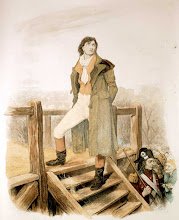
It is interesting to review the Presidents of the last century and see what sort of experience led them to the White House. We have to look back to Hoover to find what we would now consider the least experienced candidate. Hoover was appointed a minor cabinet position, the Secretary of Commerce, as a reward for supporting Harding. He lacked experience, but was able to be elected into the highest office.
Since then we have had Roosevelt who was a Governor, Truman who was a Senator and a Vice President. Eisenhower was a General, but one that was steeped in politics through his entire military career.
Kennedy was in Congress and the Senate. Johnson was in Congress and was Vice President. Nixon was in the Senate and a Vice President. Ford was in Congress, the Senate and was a Vice President. Carter was a governor and a Senator. Reagan was simply a Governor. George H.W. Bush was in Congress, Senate and was a Vice President. Clinton was a Governor as was George W. Bush.
As Americans, are we demanding our Presidents have past political experience? If so, why? Couldn’t we be better off with someone who was successful in running a big business? How about a seasoned diplomat? How about a clear thinker who knows how to resolve issues? Religious leadership seems to have fallen by the wayside with past candidates such as Jesse Jackson, Al Sharpton and Pat Robertson. Is the American political party machine unable to accept presidential candidates who haven’t paid their dues to politics?
Ralph Nader never had a chance, nor did Perot nor would Trump, nor would Gates. The unpaid political dues of Giuliani will be his doom. Being a former Mayor and a US Attorney may not be quite enough to push him over the top.
As voters it is time to consider what qualifications are important to us to place a candidate in the White House. The race is on. Unfortunately the voters will only see what the major parties want us to see.
Is it possible that we will live to see the day when a political past hinders all candidates? Are Americans ready to try someone who would be considered out of the norm for that position? Will we elect someone who delegates well? Or will we elect a decider?
Sadly, who ever gets elected will face an up hill battle. They will more than likely win with fewer than fifty-percent of the population behind them. Other politicians will be left behind to lick their wounds and wonder if their characters were now beyond repair for a future run at the office.
Those who are not elected usually return to politics and continue to be scrutinized for the rest of their political careers. Those who were in business when they ran return quietly to the business world without consequence and continue with the success they fostered before throwing their hat into the political arena.
Past Presidents always seem to get a pass in politics. Maybe because they have been there and paid their dues and can no longer influence change on the level they once could. This elevates them to elder statesmen. Who would have thought that Nixon, Ford, Carter, Johnson and Reagan would be elevated to this status while they were in the White House.
As always, we hope that we will choose a leader who will lead us into peace and prosperity. As we vote we hope our ballots are cast for the betterment of humankind. If we don’t have this hope, we would be rendered hopeless in very troubling times. For now, we can only hope that the correct candidate for our times surfaces. We hope that things will be better for us and for the generations to follow. All we ask for is hope.

